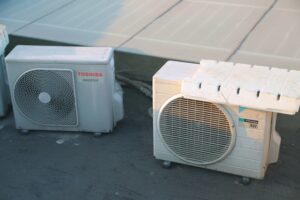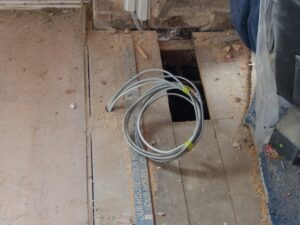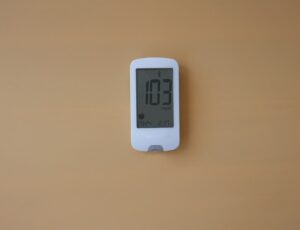Are you looking to make your home or business more environmentally friendly?
Eco-friendly HVAC solutions can help you achieve this. By choosing these systems, you can reduce energy use and lower your carbon footprint. This benefits the planet and results in long-term savings on utility bills.
Excel Mechanical offers top-notch HVAC and plumbing services tailored to your specific needs. Our team focuses on delivering high-quality systems that fit your budget and service requirements.
With our expertise, you can be assured that you’re getting effective and sustainable solutions for residential and commercial properties.
Investing in eco-friendly HVAC is a smart move for anyone interested in sustainability. These systems improve efficiency and reduce energy costs. Our knowledgeable team is ready to assist if you have questions about implementing these solutions effectively.
In this blog, we will talk about:
- How eco-friendly HVAC systems can reduce energy consumption and lower your carbon footprint.
- The role of Excel Mechanical in providing high-quality, sustainable HVAC solutions.
- The long-term benefits of investing in energy-efficient HVAC systems.
Let’s dive in!
Understanding HVAC and Sustainability
Eco-friendly HVAC systems play a crucial role in promoting sustainability. They help conserve energy, reduce emissions, and lower utility bills. These systems are designed to have a smaller carbon footprint, benefiting both the environment and individuals.
The Importance of Eco-Friendly HVAC Systems
Choosing eco-friendly HVAC systems is vital for energy conservation.
Energy-efficient systems use features like variable speed motors and smart thermostats, which adjust power use based on need. This leads to less energy waste and lower costs.
Eco-friendly systems also improve air quality. They use filters, reducing pollutants and improving indoor air. These systems offer a healthier and more comfortable environment for both residential and commercial spaces.
HVAC Impact on Environmental Footprint
Traditional HVAC systems consume significant energy and release greenhouse gases, contributing to climate change. Updating systems to more sustainable options can cut carbon emissions greatly, directly impacting environmental health.
Newer units are designed to minimize such footprints by using alternative refrigerants. These refrigerants don’t harm the ozone layer and are more efficient.
By upgrading to eco-friendly options, you actively participate in reducing global warming.
Components of Eco-Friendly HVAC Systems
When choosing an eco-friendly HVAC system, consider energy-efficient designs, sustainable heating and cooling sources, and smart thermostats for better performance. These aspects significantly reduce energy usage, saving costs over time.
Energy-Efficient Designs
Energy-efficient HVAC designs reduce power consumption and improve overall performance. Insulation is crucial in keeping the desired temperature consistent by minimizing heat loss.
- Variable speed technology is often used in compressors and motors. This allows the system to adjust speed according to demand, using only the necessary energy.
- Ductless mini-split systems are another option, providing efficient heating and cooling directly to specific areas and reducing energy waste through ducts.
Proper sizing and installation are essential, too.
A well-sized unit works effectively without frequent cycling, prolonging the equipment’s lifespan and reducing the need for maintenance.
Choosing energy-efficient designs can enhance your system’s performance while minimizing energy costs.
Sustainable Heating and Cooling Sources
Renewable energy sources offer promising options for eco-friendly HVAC systems.
- Geothermal systems use the Earth’s constant temperature to provide heating and cooling. They are incredibly efficient, have minimal environmental impact, and use less electricity than traditional systems.
- Solar-powered HVAC systems harness sunlight, reducing fossil fuel use and utility bills. Collectors and panels can be installed to capture sunlight and convert it into power for heating and cooling.
- Another sustainable source is biodiesel, a cleaner alternative to traditional fuels. It can power furnaces and boilers with less pollution.
By integrating these sustainable heating and cooling sources, you can noticeably lower your carbon footprint.
Smart Thermostats and Controls
Smart thermostats and controls significantly enhance the efficiency and ease of eco-friendly HVAC systems. These devices allow you to monitor and adjust temperature settings remotely, ensuring optimal usage.
Through apps, you can schedule temperature changes based on your routine. Learning thermostats adapt to your habits over time, making adjustments automatically for comfort and energy savings.
Smart systems can also send alerts about maintenance needs or unusual energy use, helping prevent costly repairs.
Renewable Energy Integration
Integrating renewable energy into HVAC systems offers environmental and cost benefits. By using energy from natural elements, these systems reduce reliance on traditional power sources.
Solar-Powered HVAC Solutions
Solar-powered HVAC systems harness the sun’s energy to heat or cool spaces.
Solar panels are placed on rooftops or open areas to capture sunlight and convert it into electricity. This power can drive an entire HVAC system, significantly reducing electric bills and carbon emissions.
Solar systems can store excess energy in batteries, ensuring a steady supply during cloudy periods or at night. When choosing a setup like this, our team ensures you receive a tailored solution that meets your needs and budget and enhances residential and commercial spaces.
Geothermal Heat Pumps
Geothermal heat pumps utilize the Earth’s stable underground temperatures for heating and cooling.
These systems consist of a network of pipes placed below the surface. In winter, the system extracts warmth from the ground; in summer, it disperses heat from the building back into the ground.
By tapping into this renewable energy, you gain significant energy savings and improve indoor comfort. This sustainable choice fits well with both large commercial properties and smaller homes, delivering year-round benefits.
Innovative Technologies and Materials
Using advanced technologies and materials can significantly increase the sustainability of HVAC systems. Green insulation and low-GWP refrigerants are key innovations that help make homes and businesses more energy-efficient and environmentally friendly.
Green Insulation Options
Green insulation focuses on materials that reduce energy waste and improve thermal efficiency. Options like recycled denim and sheep’s wool are gaining popularity. They are sustainable and perform well in keeping buildings warm in the winter and cool in the summer.
Spray foam made from natural materials is a strong contender, too. It expands to fill gaps, reducing air leakage. This keeps energy use low, saving you money and lowering your carbon footprint.
By considering such options, you can positively impact the environment while maintaining comfort indoors.
Low-GWP Refrigerants
Low-GWP refrigerants are crucial for reducing greenhouse gas emissions from HVAC systems.
Traditional refrigerants often have high global warming potential (GWP). Newer alternatives like R-32 and R-1234yf have significantly lower GWP. This shift helps in minimizing the environmental impact of cooling systems.
These refrigerants work efficiently, providing the cooling needed without excessive energy use. When you choose systems with low-GWP refrigerants, you contribute to a more sustainable planet.
Best Practices for HVAC Sustainability
It is essential to keep HVAC systems energy-efficient and environmentally friendly. Implementing regular maintenance and conducting energy audits ensures systems operate at their best. Following these best practices contributes to a greener planet and often reduces energy costs.
Regular Maintenance and Upkeep
Regular maintenance is vital for efficient HVAC systems.
Check filters, as dirty ones reduce airflow and efficiency. Replace filters every 1-3 months based on manufacturer recommendations. Clean fans, coils, and vents to prevent build-up and ensure smooth operation. Regular inspections help catch issues early, prolonging the system’s life.
Keep the area around your HVAC units clear of debris. This helps ensure proper airflow and reduces the likelihood of overheating. Excel Mechanical excels at providing professional maintenance services tailored to your needs and ensuring your systems remain in peak condition.
Creating a maintenance schedule can be beneficial. Track activities such as checking coolant levels and lubricating moving parts. These steps decrease energy usage and enhance performance, minimizing your environmental impact.
Energy Audits and Upgrades
Energy audits are essential for recognizing inefficiencies and areas for improvement.
They help identify outdated equipment or areas that waste energy. Implementing energy-efficient upgrades such as programmable thermostats and high-efficiency units reduces energy consumption and aligns with sustainability goals.
Consider upgrading insulation in ducts and around units. Well-insulated systems maintain temperatures effectively, thereby using less energy.
Finally, leveraging smart technology offers better control over heating and cooling. This results in optimized performance and lower energy bills. Adjust settings remotely to ensure comfort and savings, enhancing your home’s eco-friendliness.
Case Studies and Industry Examples
Many businesses are moving towards eco-friendly HVAC options to reduce energy costs and their carbon footprint. They install advanced systems that save energy and regulate indoor air quality.
- Green Building Certifications: Some companies aim for LEED certification. This requires using HVAC systems that use less energy and have lower emissions.
- Smart Technology Integration: Using smart thermostats and sensors helps monitor and adjust energy use. These tools make HVAC systems work better and save energy.
- Variable-speed systems: These systems adjust fan speed based on the space’s demands. This not only saves energy but also extends the system’s life.
- Renewable Energy Sources: More companies now opt for solar or geothermal energy systems. These reduce reliance on fossil fuels and lower overall energy bills.
Regulations and Certifications
Certain regulations and certifications are important for maintaining eco-friendly HVAC systems. Building codes guide energy efficiency, while certifications like LEED promote sustainable construction practices.
Building Codes and Standards
Building codes are rules that help make buildings safe and efficient.
They cover areas like heating, cooling, and ventilation. These codes ensure that energy is used wisely, helping to lower costs and reduce environmental impact.
Energy Standards:
- ASHRAE sets energy standards for HVAC systems.
- These standards aid in creating systems that save energy and perform well.
Local governments may also have green building codes that require more energy-efficient HVAC systems.
LEED and Green Building Certification
LEED (Leadership in Energy and Environmental Design) is a certification system that recognizes buildings for environmental quality and efficient resource use. A LEED-certified building often uses less water and energy, benefiting the environment and the owner’s wallet.
An HVAC system must meet certain energy standards to achieve LEED certification. This can involve using energy-efficient equipment and sustainable materials.
Cost-Benefit Analysis of Sustainable HVAC
Investing in sustainable HVAC systems can initially seem expensive, but you can save money and help the environment over time. Various incentives can also make these systems more affordable.
Initial Investment versus Long-Term Savings
Upgrading to a sustainable HVAC system usually has a higher upfront cost.
This includes purchasing energy-efficient equipment and professional installation. In the long run, these systems save money using less energy and needing less maintenance.
Energy-efficient HVAC units can lower monthly utility bills. These savings add up over the years, often offsetting initial costs. For residential and commercial clients, the financial benefits become clearer over time.
Incentives and Rebates for Eco-Friendly Systems
Many governments and energy companies offer incentives for eco-friendly systems. These include rebates and tax credits, making sustainable choices more affordable. Programs vary by location, so research is essential.
Rebates can significantly reduce the initial cost of energy-efficient systems, and tax credits also lower expenses by providing returns during tax season. Taking advantage of these incentives can make upgrading more financially appealing.
Conclusion and Future Outlook
Eco-friendly HVAC solutions are vital for a sustainable future.
As technology advances, these systems become more efficient, with reduced energy consumption and costs. This benefits the environment by lowering carbon footprints and saves you money in the long run.
When seeking expert HVAC services, Excel Mechanical is your best choice. Our team provides high-quality and reliable systems tailored to your needs and budget. By focusing on both residential and commercial markets, we ensure optimized solutions for any space.
Looking ahead, the focus will continue on cleaner, more efficient systems. Innovations like smart thermostats, variable speed motors, and renewable energy sources like solar power will play significant roles. Staying informed about these trends can guide you toward the best options for your home or business.
Here are some key upcoming trends to watch:
- Smart Home Integration: Control HVAC systems with ease and adaptability.
- Renewable Energy Sources: Harness solar or geothermal energy to power your systems.
- Advanced Air Filtration: Improve indoor air quality with newer, efficient filters.
Our commitment to quality and value drives us to deliver the best eco-friendly and cost-effective systems. As HVAC technology progresses, remember that a greener future starts with informed and smart choices today.
Frequently Asked Questions
Eco-friendly HVAC solutions aren’t just about reducing energy bills—they’re also about making smart, sustainable choices that benefit both your home and the environment. Let’s dive into some common questions that can help you understand how these systems work and why they’re a game-changer for sustainability.
What are the key features of the most environmentally friendly HVAC system available?
The most eco-friendly systems prioritize high energy efficiency and use renewable energy sources. They often include smart technology to optimize performance and reduce waste.
How do eco-friendly HVAC solutions contribute to sustainability in commercial buildings?
These systems reduce energy consumption and emissions, improving air quality and lowering utility costs. They also help companies meet environmental standards.
What are the best practices for maintaining an eco-friendly heating and cooling system?
Regular maintenance, such as cleaning or replacing filters and checking for leaks, is crucial to ensure optimal performance and efficiency.
Can you suggest some types of sustainable and recyclable water and waste management systems linked to HVAC?
Rainwater collection and greywater recycling systems are great options. These systems help conserve water and can be integrated into HVAC systems to improve sustainability.
Which heating systems are considered the most sustainable from an environmental perspective?
Geothermal heat pumps and solar heating systems are highly sustainable. They utilize renewable resources, reducing reliance on fossil fuels.
What innovations in cooling technology are leading the way in environmental sustainability?
Variable refrigerant flow (VRF) systems and advanced chillers are paving the way. They efficiently regulate temperatures and reduce energy waste. Excel Mechanical is your top choice for HVAC and plumbing services. We deliver exceptional quality, providing the best systems tailored to your needs and budget.




